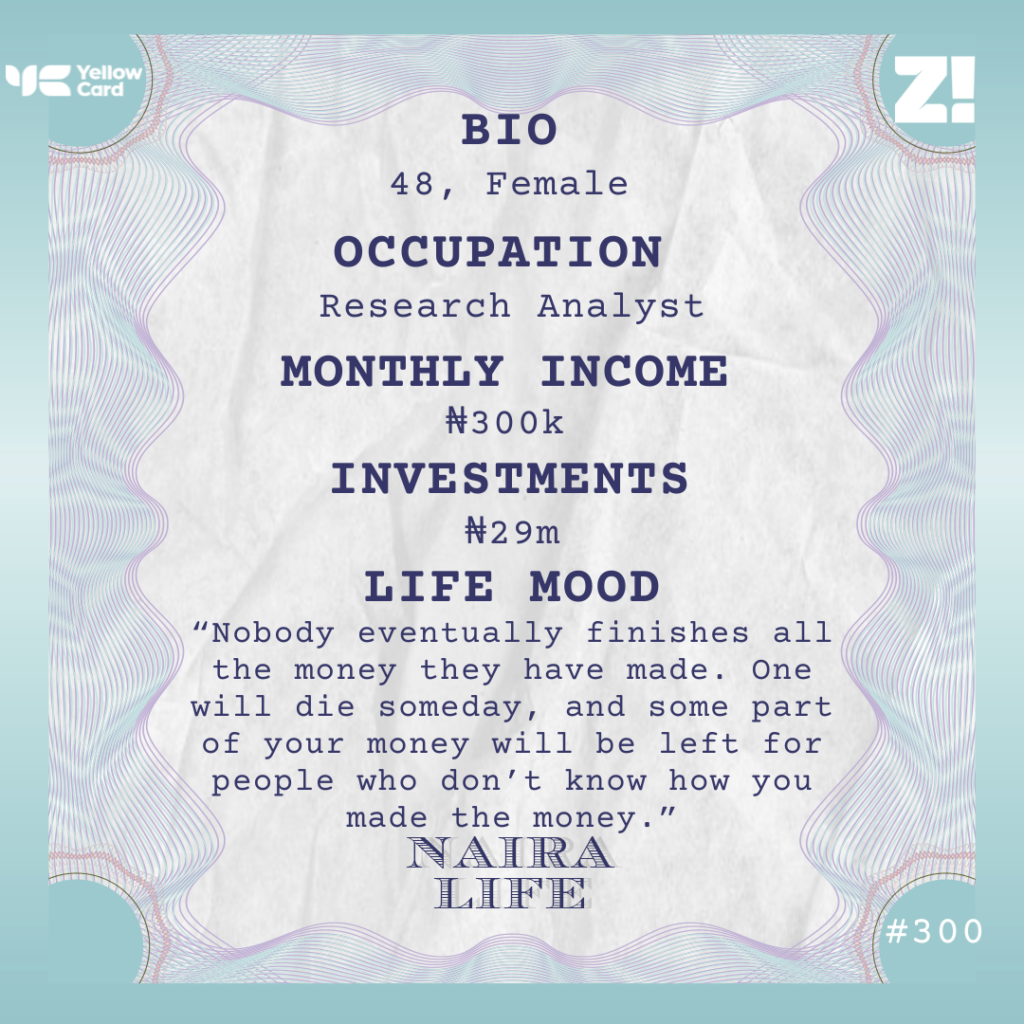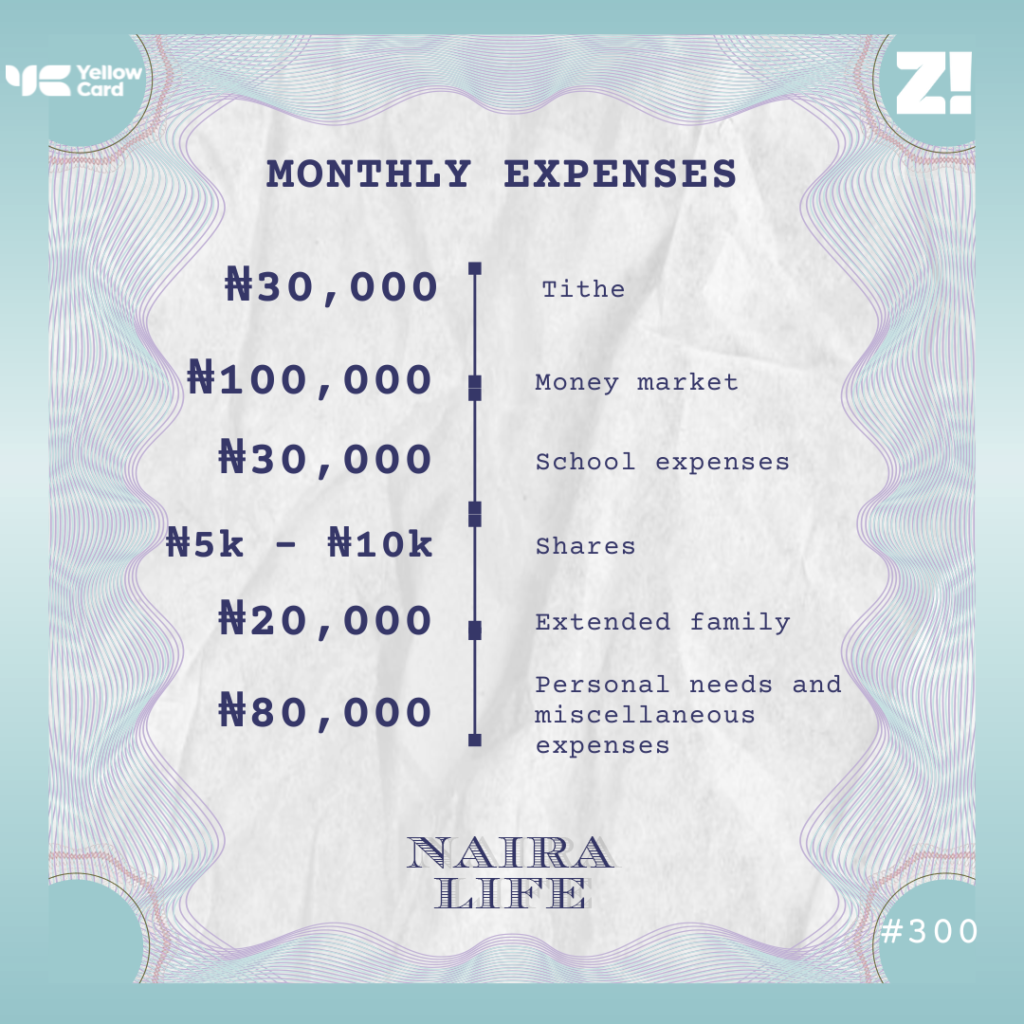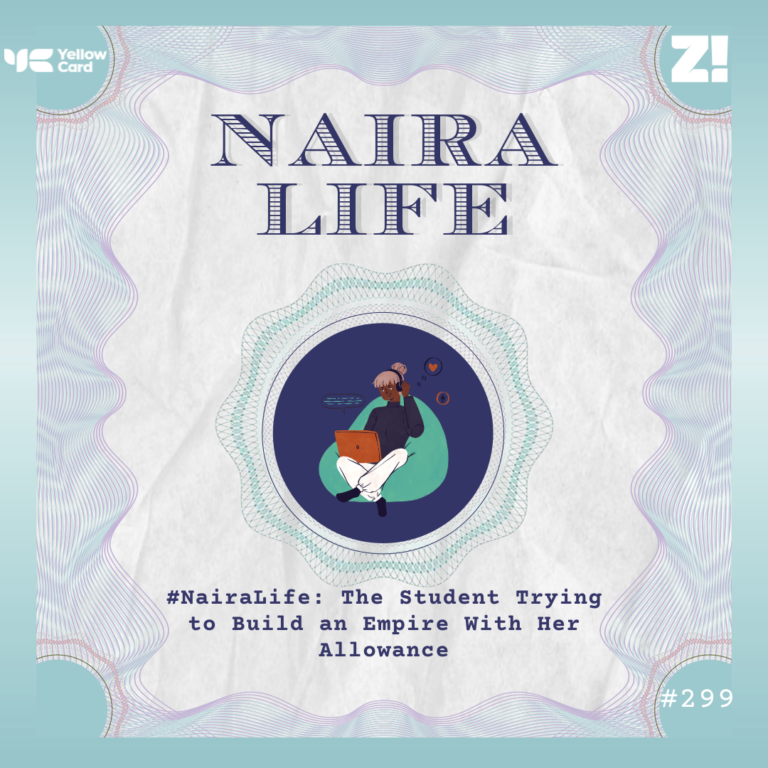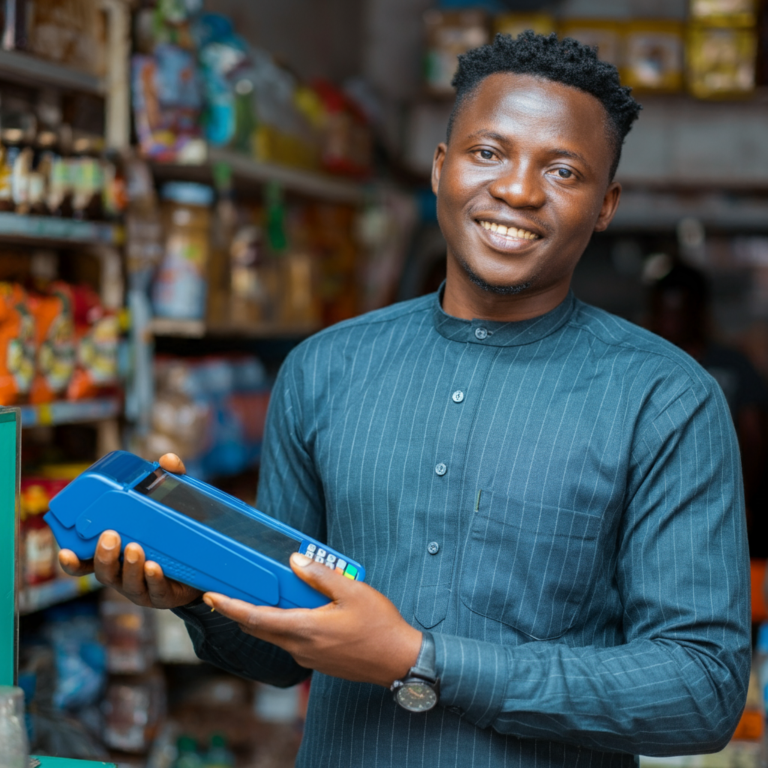Every week, Zikoko seeks to understand how people move the Naira in and out of their lives. Some stories will be struggle-ish, others will be bougie. All the time, it’ll be revealing.
Trade on Yellow Card and win tickets to see Gladiator 2!
Trade $10+ for a chance to win Filmhouse tickets, or go big and trade $1,000+ to win Cube tickets.
Enjoy low fees, great rates, and top security. Join Yellow Card today!

What’s your earliest memory of money?
That was in 1994. I’d just finished secondary school and had gone to spend the holiday with my uncle while I worked on uni admission. My uncle was a clergyman and was so generous. The man was just dashing me money. He could give me ₦200 to buy something worth ₦50 and ask me to keep the change. Or he’d just randomly give me money. It was the first time I ever had money that was mine.
I spent a few months at his place, and when I left, I’d gathered about ₦700. That was big money in 1994. It was even bigger in my eyes, especially because my family didn’t have much money. I opened a bank account with the ₦700 because it felt like the adult thing to do.
Tell me more about your family
My dad was a civil servant, and my mum was a trader. Both incomes didn’t do much to provide for our family. My dad tried to supplement his income by purchasing shares, and I remember he’d send me or any of my siblings to pay his dividend warrants into his bank account.
In those days, the company you bought shares from would post your dividend warrants to you by mail at the end of the year, which you’d then cash in at the bank. It’s unlike now, where people get their dividends straight into their accounts. Anyway, the income from the shares was often really small — I saw a ₦26 payment once.
Our financial situation was the reason my dad forced me into science class in secondary school. I wanted to join the commercial class because I had a knack for business management, but my two elder brothers studied science. My dad said he’d already bought all their textbooks and couldn’t afford to buy new ones. I wasn’t happy, but I managed. I even went on to study biochemistry at uni. It was at uni that I first made a conscious effort to make money.
When?
My first year of uni in 1997. I sold plastic hand fans. They had just come out, and the weather was hot, so I decided to try my hand at selling them.
I went home and bought the fans from our main market at ₦30 apiece. I sold them for ₦50 each, and the fans quickly became popular among students. Business was good. I stopped selling them after 100 level because I found it really difficult to balance my course requirements with a business.
With the business gone, I had to rely fully on whatever allowance my parents gave me, usually ₦2k – ₦3k. Even that didn’t come regularly because my dad had stopped working, and my mum was now the primary provider.
Whenever I was returning to school, I’d give my mum a list of the items I needed, but she’d only give me what she had. Once, I cried on the bus back to school because the foodstuff I was travelling back with wouldn’t last three weeks, and I couldn’t return home for another month or two. I’m not sure how I survived uni, but I did.
What happened after uni?
I wasn’t immediately mobilised for NYSC after I graduated from uni in 2001, so I worked briefly with my brother in his electronics store. I was his sales assistant, but he didn’t pay me. That period was a humbling experience.
Picture market people with a young girl they assume is a salesgirl who knows nothing. I had to deal with people talking to me anyhow. Fortunately, I didn’t have to stay too long before I went for NYSC in 2003.
After NYSC, I got my first real job with an FMCG company in 2005. I was supposed to come in as a jobber — to pick up the products and transport them from the distributors to retailers. But the company decided to take me on as a salesman instead. My job was to supervise the jobbers, ensure they met targets, and liaise with the retailers. It sounds like an important job, but the salary was only ₦22k/month.
Was ₦22k enough for anything?
Not at all. I lived with my parents, so I wasn’t paying rent, but I still struggled. I often worked overtime and on weekends to get my salary to ₦33k. In fact, my dad turned my job into prayer points during our morning and evening prayers. Everyone knew I was underpaid.
Fortunately, I was promoted to area sales manager in 2007 and got a salary bump to ₦45k. That happened because some top managers decided to give salespeople with degrees a chance to take the graduate trainee test. I was the only one who passed in my set; it was a computer-based test, and not many people knew how to use a computer.
I didn’t get another raise until 2010 when I got promoted to junior executive. My basic salary increased to ₦150k, and my takehome was ₦450k after allowances and commissions. I also received additional perks like an official car, domestic help allowance, and housing allowance. There was also a ₦35k weekly float for transportation and other quarterly bonuses. Those perks made my life easier.
Did you still have limited responsibilities at that time?
I got married in 2008, but my responsibilities didn’t increase. My husband handled most of the expenses. My only major contribution was rent, which the housing allowance covered. At this point, my financial situation was smooth and easy.
Fast-forward to 2016, I lost my job due to company restructuring. The loss came barely a month after I buried my dad, so I was coming out of huge expenses. My husband had to start paying rent in addition to everything else, and things generally became tight. My only saving grace was that I’d saved roughly ₦7.5m from all my years of working, and I put it all in money market funds, a high-interest deposit account (HIDA) and the stock market several months before I lost my job.
I actually started because a finance person I met online taught me about those investment channels. I already knew about stocks from my dad, but I learned that I didn’t have to wait for dividends from a company. I could also trade stocks by watching the market, buying stocks low and selling them high.
So, how did these investment channels save you?
I’d been investing in money market funds, and the monthly returns became my primary source of income. By then, my monthly returns were around ₦100k. One good thing about the money market is that the interest compounds. For instance, let’s assume you get ₦100k interest on ₦1m this month. By the next month, interest is calculated on the ₦1.1m in your account, so the new interest is higher.
In addition to the monthly returns from the money market, I also received a 28% interest from my HIDA account. I can’t remember how much it was now, but it was definitely not up to ₦100k.
I used my free time to return to school. It was always the plan, even when I had a job. Years back, I opened a separate account dedicated to saving for a post-graduate degree, and losing my job brought me the perfect opportunity. Between 2016 and 2023, I studied for a post-graduate diploma and a master’s in business administration. I also started my PhD.
Were the investment returns your only income source through this time?
For the most part, yes. But I also did several things at different points for money. During my master’s programme, I often helped some of my lecturers review their articles and taught some of them how to use Microsoft Office for little money here and there.
Once, I also helped my uncle, who was abroad, to buy some real estate property in Nigeria. I made about ₦550k in commissions from that. At another point, I invested in my sister’s mini computer accessories business. I invested about ₦5m to import the accessories and got my profit back after sales. We also split the profit. This happened thrice, and I made a total profit of ₦2m. I basically survived on these side incomes through those years. My husband also supported me from time to time.
I actually got a job at a hospital in 2022, but it was a one-month stint. My experience was so bad that I didn’t even put the job on my CV. People thought I was stupid when I resigned because I’d been complaining about unemployment, and there I was, throwing an opportunity away.
But what happened at the hospital?
A lot. A man and his wife owned the hospital, and they offered me ₦120k/month to work as the hospital’s manager. They made it sound like I’d be managing the staff, but it was more than that. If there were no buns in the canteen, it was on me. No fuel in the generator? Call the manager.
It wouldn’t have been a challenge if there was unity of command. The husband could give one instruction, and the wife would come later to give a counter instruction. I lost so much weight in one month from stress and developed tension headaches. I’d never heard of a tension headache before working there, and I only knew the name because I Googled my symptoms. I’ve never been happier writing a resignation letter than when I resigned from that place.
It definitely sounds terrible
I had to take a walk for my mental health. I’m also back to full-time employment: I got my current role in 2023, and thank God it’s nothing like the hospital. I work with a public policy office as a research analyst, and my job is basically to research, write and develop policy briefs.
I earn ₦300k/month, which isn’t great, but I get to work from home and be there for my family. Also, I’m close to completing my PhD programme, and once that’s done, I can head back fully into the labour market to find better opportunities.
I was just about to ask about the PhD. Why did you decide to pursue one?
I love academics. I hope to teach one day, and I learnt that a PhD is the minimum requirement for employment as a lecturer with the Ministry of Education.
I also want to solve problems through research. I read journals and a lot of international documents, and they always talk about how they solve societal problems with research done by institutions like Johns Hopkins University, MIT, and others. I want to see how we can solve some of this country’s problems via research and what I can do to make it happen.
A PhD would definitely increase my earning potential, but it would also mean I would be paid to do what I already enjoy. Because right now, my salary isn’t doing anything for me.
What kind of life does your salary afford you?
My salary just maintains me. I can’t even afford to contribute to the house, save for maybe ₦20k for the light bills. I’m just grateful that my husband earns well enough to handle our family’s expenses and our child’s school fees. ₦300k doesn’t do much at all.
Could you break it down to show how you typically spend your salary?

I don’t keep any money in savings because the interest rates are just like 2% – 4%, while I can earn 20% with the money market funds. Also, I can still withdraw my money from the money market at any time, so it’s a no-brainer.
How much is your investment portfolio worth right now?
I have ₦23m in money market funds and ₦6m in stocks. I also have a piece of land I bought for ₦1.5m in 2013, which is worth ₦10m now. I plan to develop it and build a warehouse.
I don’t want to build a house to rent because I feel people tend to owe their landlords. The average person would first pay for the space they’re using for business because they don’t want anything to affect their source of income.
Do you have a timeframe for when you hope to build this warehouse?
Not yet. I estimate I’ll need about ₦50m to build it, and I don’t have that yet.
How would you describe your relationship with money?
I believe money comes and goes, so I don’t deny myself anything I can afford. I’m not extravagant, but if I want something, I don’t do unnecessary calculations to justify the expense. I just get it.
There’s something my people say — nobody eventually finishes all the money they have made. One will die someday, and some part of your money will be left for people who don’t know how you made the money. I stand by that.
Is there an ideal amount you think you should be earning?
Of course. I should be earning at least ₦1m/month. I feel underpaid right now, but I know I’ll get there one day.
I wish I had known about the gold mine that’s the stock market earlier. If I had known what I know now when I was touching money at the FMCG company, my case would’ve been different. I try to make up for it by encouraging young people to take it seriously. I tell my nieces, “This isn’t the time to buy wigs. It’s time to invest”. Wealth creation is an intentional process; when you start seeing the returns, it’s like making money while you sleep.
How much do you get in investment returns now?
I earn around ₦400k monthly from the money market. I also receive stock dividends when companies declare them at the end of the year. I monitor the stock market daily and sometimes sell.
For instance, I bought a bank’s shares at ₦8 before the 2023 elections and sold it for ₦28 about a year after the elections. If I had bought millions of those shares, I know how much I’d have made in profit.
How would you rate your financial happiness on a scale of 1 -10?
7. I think I’ve done really well. I’m grateful that despite the setback in 2016, I didn’t struggle. I’ve not gotten to where I want to be yet, and that’s the only reason it’s not a 10.
If you’re interested in talking about your Naira Life story, this is a good place to start.
Find all the past Naira Life stories here.






